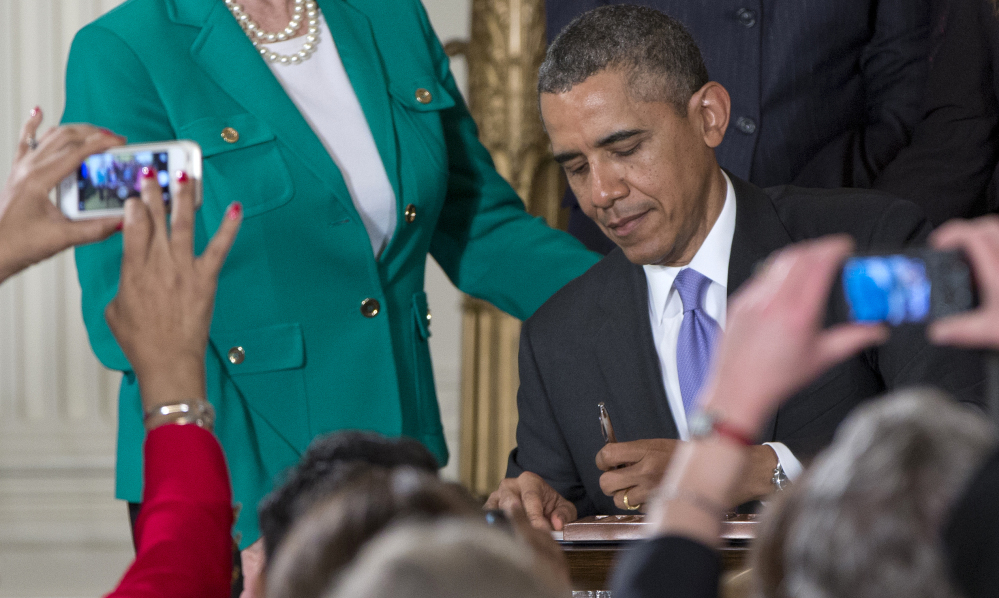WASHINGTON — In a concerted election-year push to draw attention to women’s wages, President Barack Obama signed directives Tuesday to make it easier for workers of federal contractors to get information about workplace compensation. He seasoned his move with a sharp rebuke of Republicans whom he accused of “gumming up the works” on workplace fairness.
Obama made a clear partisan appeal to women as he issued an executive order prohibiting federal contractors from retaliating against workers who discuss their pay. He also directed the Labor Department to write rules requiring federal contractors to provide compensation data by race and gender.
“This is about Republicans seemingly opposing any efforts to even the playing field for working families,” Obama said at a White House signing ceremony, surrounded by women advocates and accompanied by Lilly Ledbetter, a woman whose namesake legislation on pay equity was the first bill Obama signed into law in 2009.
Obama’s actions focused exclusively on federal contractors but they dovetailed with the start of Senate debate on broader legislation to make it easier for workers to sue any company for paying women less because of their gender. That legislation is expected to fail, as it has in the past, due to Republican opposition.
The Senate legislation, like Obama’s narrower executive order, would forbid companies from punishing workers who share salary information and would allow punitive and compensatory damages in lawsuits. It would make it harder for companies to prove disparities in pay are not gender based and would make it easier to file class action lawsuits.
Republican Sen. Deb Fischer of Nebraska said she would offer an amendment to narrow the measure, mostly by banning employer retaliation against workers who share salary information. She and several other Republican senators said they would likely vote to block debate on the overall bill on Wednesday unless Democrats allow votes on GOP amendments.
Fischer said the Democratic bill would harm merit pay, allow unlimited damage claims in lawsuits against employers, and hinder people from accepting lower pay in exchange for more flexible work hours.
Nearly a dozen Democratic women senators took to the chamber’s floor Tuesday to support the legislation.
“We believe that women need a fair shot to get equal pay for equal work,” said Sen. Barbara Mikulski, D-Md., the measure’s sponsor. “And we want it in our law books and we want it in our checkbooks.”
Sen. Chuck Schumer of New York, the Senate’s No. 3 Democratic leader, said equalizing pay for men and women was a popular issue and warned Republicans opposing the measure, “We’re going to come back to this issue several times this year.”
The National Labor Relations Board and some federal courts already have determined company pay secrecy rules are prohibited under the National Labor Relations Act. But cases against violators can only be brought by the NLRB on the basis of a complaint. The Senate bill would spell out the prohibition and allow for potentially penalizing private lawsuits.
Obama’s directive for compensation data is not the first time the administration considered seeking such statistics. The Labor Department in 2011 sought public comment on how to collect wage information, but so far no rule has been proposed. Obama’s action essentially instructs the department to take the next step.
The debate over pay equality is complicated by varying wage gap measures.
Obama cited Census Bureau figures show annual earnings for women were 77 percent of what men earned in 2012.
But when measured by hourly earnings, that difference narrows to 86 percent, according to the federal Bureau of Labor Statistics. The larger gap is in part because women tend to work fewer hours than men and because annual figures include items omitted from hourly data, including tips and bonuses. An analysis of 2012 data by the Pew Research Center placed the discrepancy at 84 cents for women for every $1 made by men.
A recent review of staff salaries at the White House found the president’s female aides were paid 88 cents for every dollar paid to men. White House officials say men and women in equivalent roles at the White House earn the same amount, but that there are more women in lower paying positions.
Send questions/comments to the editors.



Comments are no longer available on this story